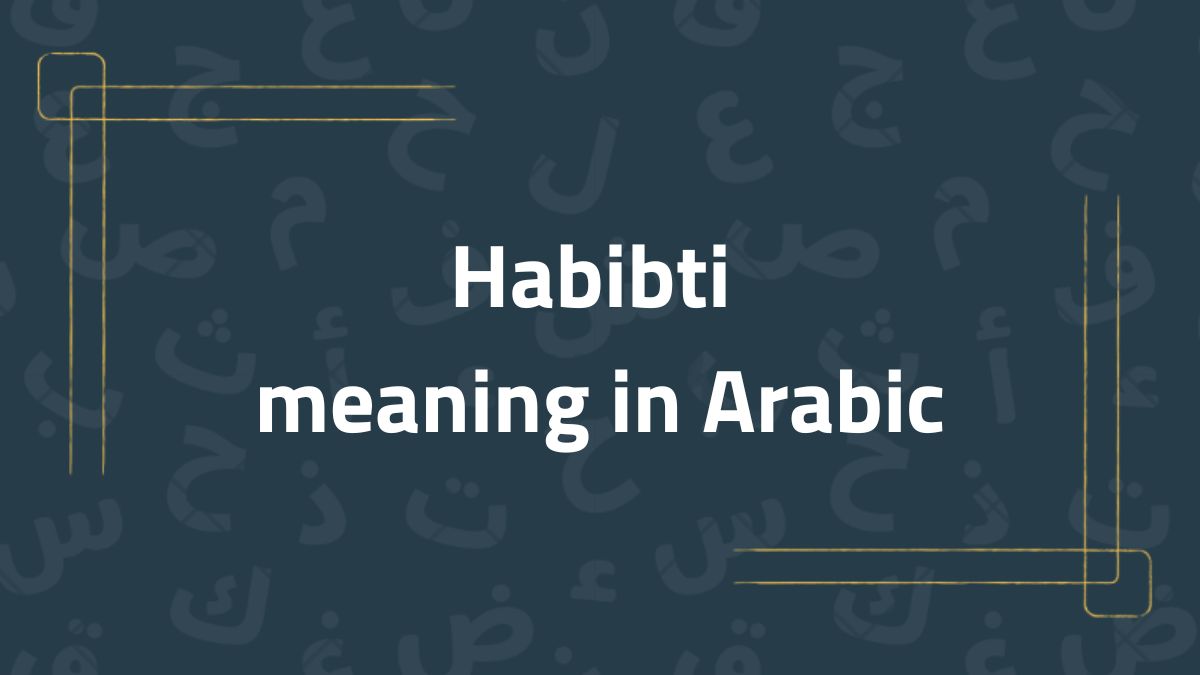The Word Habibti Meaning in Arabic With Examples

The Arabic word “habibti” (حبيبتي) carries deep emotional meaning. It is a term of endearment used to express love and affection. This article explains the meaning of “habibti” in Arabic, its linguistic roots, cultural significance, and common usage.
The Meaning of “Habibti” in Arabic
“Habibti” translates to “my beloved” or “my darling” in English. It is the feminine form of the word “habibi” (حبيبي), which means “my love” when addressing a male. The pronunciation is ha-beeb-tee, with emphasis on the second syllable.
Linguistic Root and Grammatical Usage
The word “habibti” comes from the Arabic root ح-ب-ب (H-B-B), which relates to love and affection. The base word is “habib” (حبيب), meaning “beloved” or “darling.” Adding the feminine possessive suffix “-ti” turns it into “my beloved (female).”
In Arabic grammar:
-
Habib (حبيب) – Beloved (masculine)
-
Habiba (حبيبة) – Beloved (feminine)
-
Habibi (حبيبي) – My beloved (addressing a male)
-
Habibti (حبيبتي) – My beloved (addressing a female)
Examples of “Habibti” in Arabic Sentences
-
“Habibti, kayfa haluki?” (حبيبتي، كيف حالك؟)
-
“My love, how are you?”
-
-
“Ana uhibbuki ya habibti.” (أنا أحبك يا حبيبتي.)
-
“I love you, my darling.”
-
-
“Shukran habibti ala musa’adatiki.” (شكراً حبيبتي على مساعدتك.)
-
“Thank you, my love, for your help.”
-
Cultural or Quranic Significance of “Habibti”
The root word “habib” appears in the Quran, often describing Allah’s love for righteous believers. For example:
-
“Innallaha yuhibbu al-muttaqeen” (إن الله يحب المتقين)
-
“Indeed, Allah loves the righteous.” (Quran 3:76)
-
While “habibti” itself is not in the Quran, its root carries religious weight. In Arab culture, the word is commonly used between spouses, family members, and close friends to express deep affection.
Common Misunderstandings or Mistakes
-
Confusing “habibi” and “habibti”: “Habibi” is for males, while “habibti” is for females.
-
Overusing the term: In formal settings, “habibti” may sound too intimate.
-
Mispronunciation: Some may say “habibi” for females, which is incorrect.
Why You Should Learn “Habibti”
Understanding “habibti” helps in:
-
Expressing love in Arabic conversations.
-
Strengthening relationships with Arabic speakers.
-
Recognizing terms of endearment in Islamic texts and daily life.
Conclusion
“Habibti” is a beautiful Arabic word meaning “my beloved” or “my darling.” It comes from the root H-B-B, linked to love in both language and religion. Learning this term enhances communication and cultural understanding. Whether speaking to a loved one or studying Arabic, knowing “habibti” enriches language skills.
By mastering words like “habibti,” learners gain deeper insight into Arabic expressions of love and affection.
Learn Arabic, Quran, And Tajweed With Free Trial!
Make your home a place of faith, understanding, and connection with the Quran. Whether you're starting from scratch or deepening your knowledge, Shaykhi Academy is here to guide you — step by step. ✅ Tailored for all ages ✅ Clear, structured learning ✅ Flexible online sessions ✅ Book your free trial session now!
Learn More
